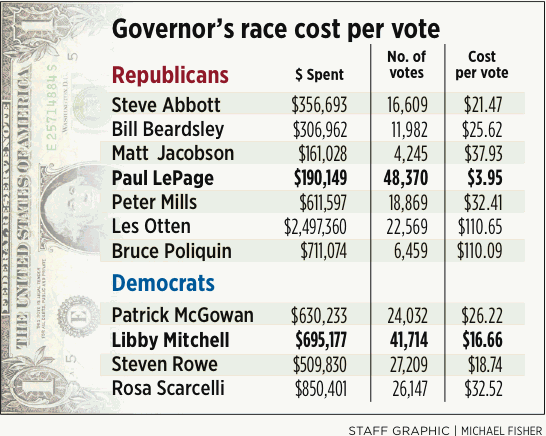Marden’s is where many Mainers look for serious bargains, so perhaps it’s no surprise that Paul LePage, the retailer’s general manager, got his votes for cheap in Tuesday’s primary.
LePage’s campaign spent about $190,000, according to preliminary finance reports, to win the Republican gubernatorial nomination with 48,370 votes. That works out to less than $4 per vote.
contrast, Les Otten spent nearly $2.5 million seeking the same nomination. He came in second — and spent more than $110 for each of the 22,569 votes cast for him.
John Morris, chief of staff for LePage’s campaign, said spending little wasn’t a strategy, but it does reflect the candidate’s philosophy.
“We just didn’t spend money foolishly,” he said. “It reflects the values and the frugality of the candidate. It demonstrates what he will do in Augusta.”
Morris credits volunteers for helping to keep the campaign’s costs down. LePage apparently captured a lot of energetic support from conservative tea party backers.
“How do you put a dollar value on an enthusiastic volunteer who works for you 20 hours a week?” Morris said.
At the other end of spectrum, Otten said he had to spend a lot of money on his campaign, which worked out to $110.65 per vote.
Otten said much of his advertising, particularly late in the campaign, answered ads criticizing his management of American Skiing Co., the string of ski resorts that he built about a decade ago. The company ran into financial difficulties and ended up selling off all of the resorts.
Otten said ads by opponent Bruce Poliquin inaccurately suggested that the company went bankrupt and the resorts cut hundreds of jobs.
“It is much more expensive to run a positive campaign than it is to run a negative one,” Otten said. “It cost money to respond to that, and I was willing to do that. We spent a considerable amount of money defending ourselves.”
Dennis Bailey, a consultant to Rosa Scarcelli’s campaign for the Democratic nomination, said the amount spent — he said TV ads usually account for about 80 cents of each dollar spent — shows just how expensive it is to run for office.
Bailey said most of the effort to reform campaign spending focuses on limiting contributions, but “we really ought to be finding a way to reduce expenses.”
He said Scarcelli spent the most — overall and per-vote — among the four Democrats because she has been a business executive, not a politician. “Rosa was a total unknown and she needed the money to get her name out there,” he said.
Scarcelli pumped much of her own money into her campaign, contributing nearly $250,000 in the last two weeks alone. Otten loaned his campaign most of its money.
Bailey said LePage’s win in the Republican primary was probably the most interesting because he spent so little compared with the other candidates. “He’s really caught a wave,” Bailey said. “He’s a special case. There are plenty of people in Otten’s position, who spend a lot and lose, but there aren’t many in LePage’s case, who spend so little and win.”
Jay York, who was attending a Portland Charter Commission meeting Thursday, said he was surprised and impressed with LePage’s showing.
“Paul LePage was very cost-effective in getting his votes,” York said. “It also proves that money is not as important as being responsive to your constituents. He spoke to things that people were concerned about.”
Naomi Mermin of Portland said LePage proved a point. “Money is not the driving force. Clearly, the ability to reach people is what is important. You can do that two ways: with cash or with social capital. He did it with social capital.”
Douglas Hodgkin, a professor emeritus of political science at Bates College in Lewiston, said money can sometimes backfire in politics.
“Spending is not the be-all and end-all of campaigning,” he said. “It’s possible some voters could have been turned off by what they believed was excessive spending, thinking the candidate may have been attempting to buy the office.”
Conversely, some people may have liked the fact that LePage spent little, enhancing his image as a self-made person who isn’t interested in slick packaging, Hodgkin said.
But his support from the tea party movement may have been the key, bringing out people who were willing to knock on doors for the campaign and talk up LePage with their families and neighbors, Hodgkin said.
“Enthusiastic volunteers can go a long way, as we saw in this race,” he said.
Hodgkin said it appeared that many of Tuesday’s voters turned out specifically to vote for LePage, and they were largely immune to advertising by other campaigns, no matter how much was spent.
Hodgkin said he worked at the polls Tuesday and found that many unenrolled voters asked to register with the parties so they could vote in the primaries. He sent those voters to a table where they could change from independent voters.
When they returned to his table to pick up ballots, he said, most had registered as Republicans.
Staff Writer Dennis Hoey contributed to this report.
Staff Writer Edward D. Murphy can be contacted at 791-6465 or at:
emurphy@pressherald.com
Send questions/comments to the editors.




Success. Please wait for the page to reload. If the page does not reload within 5 seconds, please refresh the page.
Enter your email and password to access comments.
Hi, to comment on stories you must . This profile is in addition to your subscription and website login.
Already have a commenting profile? .
Invalid username/password.
Please check your email to confirm and complete your registration.
Only subscribers are eligible to post comments. Please subscribe or login first for digital access. Here’s why.
Use the form below to reset your password. When you've submitted your account email, we will send an email with a reset code.